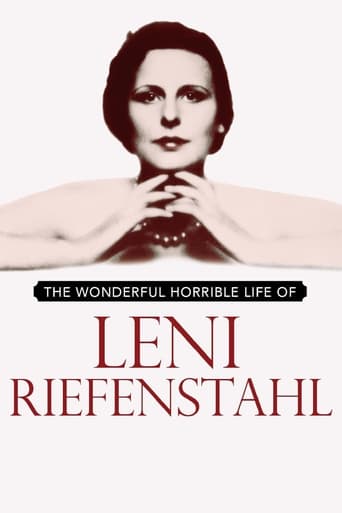Edgar Soberon Torchia
The horrible, manipulative English DVD title and packaging of Ray Müller's "Die Macht der Bilder" should not prevent you from watching this portrait of a fascinating personality, beautiful woman and polemic figure. Beyond all ideological or emotional reactions to Leni Riefenstahl's films, this works proves beyond doubt that she was a masterful filmmaker. The careful conception and framing of the persons, objects and events she filmed, the beauty of the resulting images, the inventiveness of her "mise-en-caméra", her passion and vision, make Riefenstahl a major figure of film history and one of the greatest contributors to the evolution of film expression. The complete 200 minute version of Müller's documentary includes four sequences that were cut from the international edition. Two of them are in the second part, and they are chronologically disrupting, for they were inserted before showing her photographic work with the Nubas in Africa, and the underwater shootings during the final part of her life. One sequence in particular (a most embarrassing and decadent montage in Las Vegas, visiting her magician friends Siegfried & Roy) damages the documentary, for it shows --for no dramatic reason-- Riefenstahl's least appealing and most frivolous side, right after the tragic account of the trials she went through after the war ended. On the other hand, the extensive footage filmed in Tokyo, where the exhibit "Leni Riefenstahl - Life" opened in 1991, though out of place, is welcome for it shows that her work was reinstated and recognized in some places during her lifetime. The exhibit was one of the first comprehensive displays of her photographic work, mainly consisting of photos of or by her, of enlarged frames of films she played in as an actress and of films she made herself. There is also a section of Riefenstahl posing for photographs. For a complete portrait of Riefenstahl these sequences add another angle, and although Müller's work loses some cohesiveness, the negative effect of these sections is not powerful enough as to erase the impact one experiences before and after, in this approximation to Leni Riefenstahl's impressive, tragic and rich life.
shu-fen
Athens 2004, the 28th Olympiad starts at this very moment. The very person I can think of is the late 101-year-old controversial, influential and unbeatable Leni Riefenstahl, a poor wasted genius whose life and career were both 100% brutally ruined by a political party, or maybe herself too.The fantastic and unforgettable dogme covers her life comprehensively since her rise to fame as an actress in silent movie until her most recent life in early 90's. No one would deny that she was a pioneer in film-making especially the technical aspect. Some of her invented methods are still widely adopted: burying a camera into the ground to shoot a running athlete etc. And again, sheerly from the artistic point of view, (sorry, Jewish friends), no one would deny her Olympia: Festival of the Nations + Festival of Beauty and Triumph of the Will are films which can successfully instigate the Aryan patriotism and emotion. Picture that, she had done all these in her thirties.What hits people the most should be Riefenstahl's toughness and strong will. That's exactly what I envy of: her infinite energy and creativity. Though she failed to collect funds to produce films, she turned to African tribes, the underwater organism and we can still see her dazzling light in photography. She was full of humour, for instance, she told the dogme directors that she lied about her age (to be 20 years younger, "70") so she could dive into deep water at 90 in a childlike manner. She complained to the production crew that "talking while walking is like a talking vampire" that she didn't want to use the mic.She may or might have created her own tragedy. "Wrong timing", I believe should be the most appropriate description of her life: she rose to fame too soon and rolled down from it too soon. RIP, Leni, you don't need to shoot anything about the 2004 Athens Olympic Games for anyone's ambition, including your own.
fkerr
For American tastes, this documentary is much too long for the subject matter. Yet, it is worth watching for several reasons. Considerable insight into the early appeal of Hitler to the German people shows through Frau Riefenstahl's comments. More than that, though, is the detailed presentation of a master documentary filmmaker and her secrets. As evidenced through her later work in Africa and under the sea, she is an amazing woman. Her comments and her work are presented in such a way that both can be appreciated.
mpenman
This film explores the boundaries between the artistic and the political (or, when does fiction have to pay for the reality it may help to create?).Why is Leni Riefenstahl, who created propaganda for the murderous Hitler ("Olympia" -- which pioneered many of the techniques now cliche in sports camerawork and editing, and the notorious "Triumph of the Will"), despised and reviled while the work of Eisenstein and others who created propaganda for the murderous Stalin is lovingly taught in film schools? Well, maybe it was because Stalin was on the winning side of the war, according to Ms. Riefenstahl, a tough old broad who was apparently ecstatic about being interviewed. Up to a point.This is a top-notch documentary. The cinematography is gorgeous. The probing questions are important. Riefenstahl is alternately combative, charming, evasive . . . and a whole lot of other things.I give it a 9 of 10.

